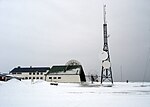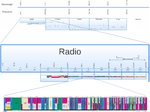2182 kHz is a radio frequency designed exclusively for distress calls and related calling operations in the maritime service. It is equivalent to a wavelength...
8 KB (822 words) - 22:36, 5 September 2024
are marked in GREEN which is the corresponding silence period for the 2182 kHz voice communications distress signals. In addition, during this silent...
13 KB (1,568 words) - 10:44, 4 September 2023
the top of the hour; and were also required to observe radio silence on 2182 kHz (upper-sideband radiotelephony) for the first three minutes of each hour...
10 KB (1,188 words) - 23:17, 13 September 2024
listen for priority signals, for 3 minutes, at different times for 500 kHz and 2182 kHz. Since many merchant vessels carried only one or two radio operators...
22 KB (2,388 words) - 07:34, 9 October 2024
16 (156.8 MHz) and 2182 kHz now used for distress, safety and calling. A listening watch aboard GMDSS-equipped ships on 2182 kHz ended on February 1...
30 KB (4,053 words) - 22:06, 13 October 2024
itself on a distress and listening frequency such as VHF Channel 16 or MF 2182 kHz, and then change frequency to a working channel for the body of the messages...
4 KB (609 words) - 13:26, 6 June 2022
distress chanel watch (DSC-Watch) on VHF Chanel 16. Not all station monitore 2182 kHz shortwave anymore. Marconi Station Utility station KPH - A preserved RCA...
3 KB (199 words) - 01:08, 29 October 2023
over very high frequency channel 16 (156.8 MHz) or medium frequency on 2182 kHz Transmitting a digital distress signal by activating (or pressing) the...
18 KB (2,193 words) - 04:47, 6 November 2024
are: 2182 kHz for medium range maritime voice use. The US Coast Guard has said "beginning August 1st, 2013 the Coast Guard would no longer monitor 2182 kHz"...
12 KB (1,197 words) - 13:00, 10 September 2024
some of the safety applications previously served by 500 kHz and other frequencies. 2182 kHz is a medium-wave frequency still used for marine emergency...
44 KB (2,900 words) - 09:12, 21 October 2024
flights. These systems incorporate frequencies down to 2 MHz to include the 2182 kHz international distress and calling channel. The upper section of HF (26...
18 KB (2,035 words) - 02:49, 5 November 2024
town Tent city Urban farms Urban resilience Communication & navigation 2182 kHz 24-hour clock 24-hour analog dial Amateur radio Citizens band radio EPIRB...
3 KB (297 words) - 02:20, 30 September 2024
license classes in a few selected countries are: 2.25 kW in Canada; 1.5 kW in the United States; 1.0 kW in Belgium, Luxembourg, Switzerland, South Africa...
65 KB (7,115 words) - 01:25, 25 October 2024
areas denote 3 minute periods during which radio silence was maintained to facilitate listening for distress calls at 2182 kHz and 500 kHz respectively....
13 KB (1,585 words) - 13:04, 23 April 2024
missing. The recovery party noted that the radio was discovered tuned to 2182 kHz, the international marine radiotelephone distress channel. Barnacle growth...
32 KB (3,511 words) - 03:04, 28 August 2024
07:34, probably because US stations stopped listening on the frequency 2182 kHz. At 17:30 on 12 December, international search and rescue operations were...
14 KB (1,868 words) - 00:50, 7 June 2024
Bride survived, Phillips perished in the sinking. 500 kHz (Morse distress frequency) 2182 kHz (voice distress frequency) Global Maritime Distress and...
9 KB (900 words) - 00:09, 7 January 2024
navigation occupy a band from 190 to 435 kHz, which overlaps from the LF into the bottom part of the MF band. 2182 kHz is the international calling and distress...
12 KB (1,525 words) - 02:08, 1 August 2023
can decode signals with a signal-to-noise ratio as low as −28 dB in a 2500 Hz bandwidth. Stations with internet access can automatically upload their reception...
10 KB (988 words) - 19:38, 6 September 2024
similar broadcast on MF is initially announced on 2182 kHz, with a further frequency specified, e.g., 1770 kHz. VHF optimum range is approximately 30 nautical...
49 KB (5,937 words) - 15:37, 30 October 2024
includes significantly narrower 6.25 kHz channel spacing, and would support voice and data applications. 2182 kHz Automated Maritime Telecommunications...
45 KB (2,503 words) - 02:27, 21 September 2024
decode FT8 signals with a signal-to-noise ratio as low as −20 dB in a 2500 Hz bandwidth, which is significantly lower than conventional CW or SSB transmissions...
8 KB (728 words) - 17:16, 4 September 2024
(500 kHz)? I can communicate by radiotelegraphy (500 kHz). QOB Can you communicate by radiotelephony (2182 kHz)? I can communicate by radiotelephony (2182 kHz)...
4 KB (124 words) - 19:32, 28 May 2022
distress frequency 156.525 MHz (CH-70) 2187.5 kHz 4207.5 kHz 6312.0 kHz 8414.5 kHz 12577.0 kHz 16804.5 kHz 2182 kHz International maritime call and distress...
17 KB (1,433 words) - 21:03, 7 August 2024
symbol rate limit of 300 baud in favor of an occupied bandwidth limit of 2.8 KHz (WT Docket No. 16-239). In the Report and Order, the FCC stated, "The amateur...
17 KB (1,997 words) - 08:16, 19 October 2024
servers for the Winlink system began in January 2010. 500 Hz bandwidth uses 2 carriers, 1600 Hz bandwidth uses 8 carriers. Each carrier uses 46.875 Baud...
3 KB (262 words) - 01:33, 28 December 2023
Tianjin Coastal Radio operates the DSC system, monitoring VHF Ch. 16 and MF 2182 kHz as per the requirements of SOLAS. The NAVTEX system operates at present...
96 KB (9,159 words) - 21:28, 10 February 2024
Conquet-Radio on 500 kHz (closed 1997) on 2182 kHz on channel 16 VHF (closed 1999) on MMSI: 00 227 0300 channel 70 on 2187,5 kHz (closed 1999) 31 January...
3 KB (391 words) - 03:07, 25 May 2024
16, 2182 kHZ, and DSC (Digital Selective Calling) channel 70 (2187.5 kHz) are used. French-language AVURNAV or BMS NAVTEX broadcasts use 490 kHz. In overseas...
16 KB (1,779 words) - 14:46, 14 September 2024
and 1000 kHz. Transoceanic wireless telegraph stations were large high powered stations with huge antenna structures, with output power of 100 kW to one...
52 KB (6,227 words) - 21:50, 3 November 2024













